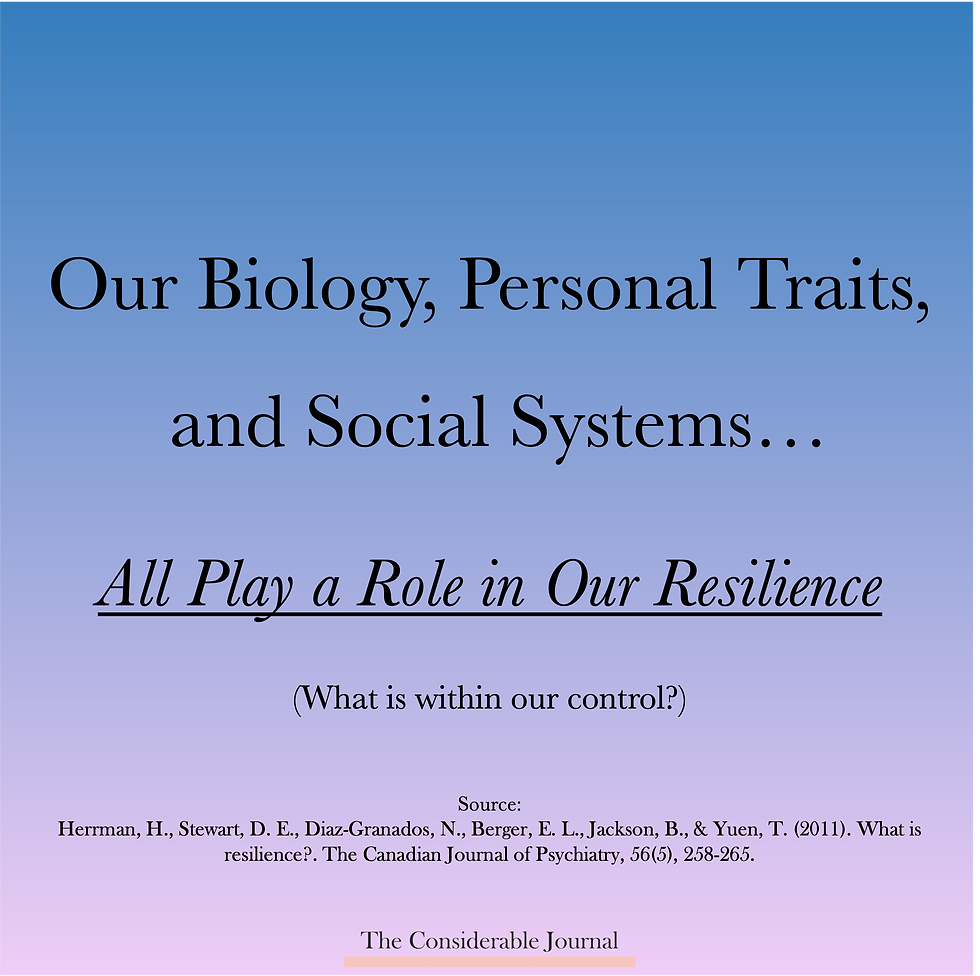Our Biology, Personal Traits, and Social Systems All Play a Role in Our Resilience
- Considerable Journal
- Mar 6, 2023
- 3 min read
Updated: Mar 11, 2023

Resilience is the ability to maintain our mental wellbeing and adapt positively to difficult circumstances. It is our toughness through life’s hardest moments. But building resilience isn't always easy. Researchers in Canada (Herman et al., 2011) dug into the factors that play a role in resilience, and found that there are many different aspects of life that play a part. Some of these factors are within our control and some are not, but understanding them can help us work on building our own resilience.
The researchers took a close look at many studies about resilience that were published between 2006 and 2010, and combined their results in a meta-analysis*. After their review, they found that resilience is impacted by a combination of biological, personal, and systemic factors, which could be thought of as the elements of resilience.
(*a meta-analysis is a statistical process that combines the results of several studies to provide a more precise estimate of the overall effect of a particular phenomenon).
Biological factors relate to how our bodies work. Some biological factors that can affect how well we deal with stress and difficult situations include aspects such as a healthy start in life, supportive caretakers, and cortisol levels, which are related to how well we can handle stress in daily life.
Personal factors refer to our personalities, attitudes, and beliefs. Traits such as being outgoing, creative, confident, having a positive self-image, and being resourceful can all help us be more resilient- and the good news is that these traits can be developed and strengthened over time.
Systemic factors are about the people in our lives who support us – such as our families and friends. Having positive relationships with these people can make a big difference when it comes to being resilient. It is important to note that while some family relationships may be challenging to alter, we can still work on building new relationships and expanding our social network.
While some signs of resilience (such as emotional regulation, low behavioral issues, and positive relationships) may show up in childhood, the authors note that having those traits is not a must for everyone who turns out to be resilient. There’s always opportunity to change perspective, look at potential positive outcomes, and create healthy, supportive relationships.
Resilience is just the beginning. The authors suggest that the journey towards overcoming adversity continues with hardiness (having a sense of control over one’s life), benefit-finding (making meaning from adversity), thriving (being able to go back to one’s normal state despite difficult situations), and post-traumatic growth (experiencing a sense of personal growth, improvement, and deeper relationships with others, after overcoming adversity).
Resilience is what helps us stay strong during tough times. It's influenced by a combination of biological, personal, and systemic factors. While some aspects such as our biology and certain relationships may be outside of our control, we have the power to embrace and develop our personal traits, create positive relationships, and build a strong network of support. All of this can help us face life’s challenges with strength– and, at the same time, we can contribute to the resilience of others by being a supportive member of their social system.
Source:
Herrman, H., Stewart, D. E., Diaz-Granados, N., Berger, E. L., Jackson, B., & Yuen, T. (2011). What is resilience?. The Canadian Journal of Psychiatry, 56(5), 258-265.
Article written by Tiffany Wicks and Maggie Stilman.
The Considerable Journal.
The Considerable Journal's mission is to bring relevant scientific findings closer to people who seek evidence-based paths to integral well-being, by providing briefed, straightforward expositions of scientific research regarding mental and physical health, relationships, habits, and more.




Comments